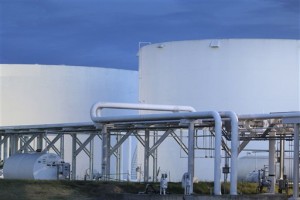
In this photo taken July 2, 2012, early morning sunlight illuminates fuel storage tanks at a North Little Rock, Arkansas, petroleum distributorship.AP FILE PHOTO
MANILA, Philippines—The Independent Oil Price Review Committee (IOPRC)—a panel of seven representatives from various sectors—has cleared local oil companies of allegations of overpricing and collusion after a six-month extensive review showed that there were no “extraordinary” movements in the pump prices in the Philippines and that oil firms did not register exorbitant profit margins over the past decade.
In a briefing on Wednesday, former Budget Secretary and IOPRC head Benjamin Diokno said local fuel price adjustments mirrored the movements of prices in the global market as deregulation, in fact, resulted in increased responsiveness of local pump prices (represented by Metro Manila prices) to world oil prices, compared to the time when the industry was regulated.
Diokno also noted that oil companies’ profits were deemed reasonable in relation to other industries and were even lower compared to certain sector.
“Oil deregulation resulted in a lower average return on equity (ROE) of three major oil companies. Average ROE was estimated at 23 percent during the regulated regime (limited to 1994 to 1996), which was much higher than the average ROE at 13 percent under the deregulated regime,” Diokno explained.
The results of the study, however, were slammed by some groups, which insisted that there was an overpricing of fuel products in the country.
Bayan Muna party-list Representative Teddy Casiño said the report was “simply unbelievable.”
“We have seen independent studies showing an overpricing in diesel of P7.86 per liter and gasoline by P16.18 per liter. We in Congress await and will definitely scrutinize the audit team’s full report to include all their sources and references,” Casiño said.
Bagong Alyansang Makabayan (Bayan) secretary general Renato Reyes Jr. said the report “practically legitimized oil firms’ super profits and justified the public’s suffering.”
Although the study cleared the oil firms of alleged overpricing and collusion, the panel put forward several recommendations aimed at ensuring that the “public is not being shortchanged in terms of quantity and quality.”
These recommendations include:
• The government should review the possible deregulation of the land transport sector since the regulated regime of the transport sector prevents it from adjusting fares to immediately compensate for rising fuel prices. An automatic fare-setting system must be created to respond immediately to fuel price adjustments.
• The government should continue to support the oil deregulated regime on the premise that greater responsiveness of local pump prices to world oil prices and that a lower and less volatile ratio of local pump prices to world oil prices are desirable goals.
• In keeping with the spirit of transparency and fiscal responsibility, the government should resist any temptation to subsidize fuel and electricity consumption. Subsidies, according to Diokno, may have dire consequences on the country’s prospects for future credit upgrades.
• The Department of Energy (DoE) should continue to actively monitor oil companies and ensure that they effect reasonable and fair changes in pump prices in response to changes in their input prices.
• The DoE should step up its task of monitoring oil companies to ensure that they effect reasonable and fair changes in pump prices in response to changes in their input prices.
• The DoE should require oil companies to submit their audited financial statements annually and correspondingly build a staff of industry financial experts.